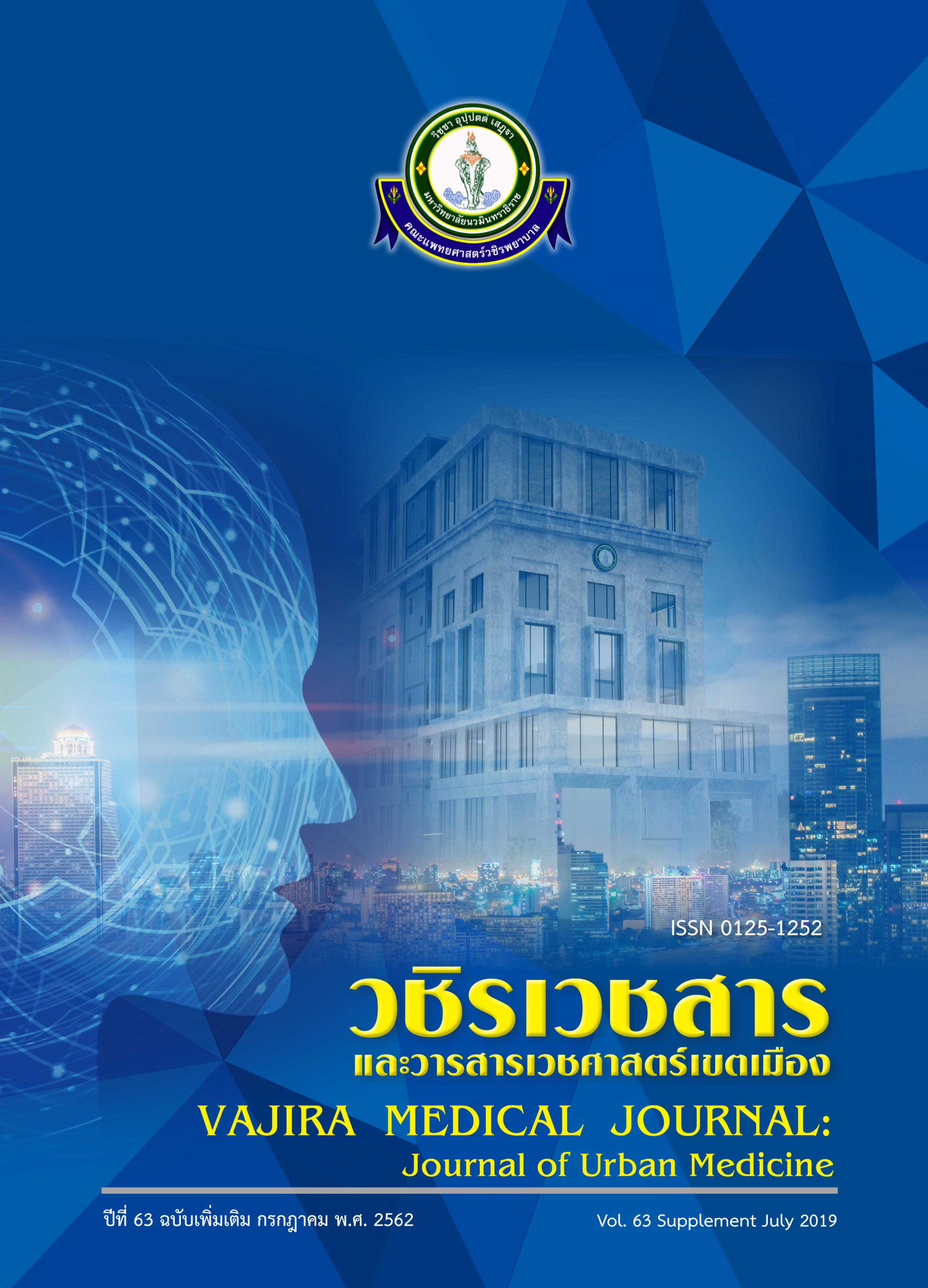Health Literacy of Healthy Aging among Elderly People in Bangkok Metropolitan: A Case Study for Promoting Health Literacy Elderly
Main Article Content
Abstract
Objective: To understand the characteristics of healthy elderly people having a high level of health literacy.
Methods: The qualitative research methodology was used and focused on case study. This study also used an in-depth interview among healthy elderly people who have high score of health literacy. The semi-structured interview guide was performed. Content analysis was used to analyze the data.
Results: The characteristics of healthy elderly for healthy aging among elderly people in Bangkok Metropolitan included an accessing to health information (such as a social participation, and a accessing to health information, easily and rapidly); Understanding to health information (such as health service client gave the information clearly and hastily, and instructional media about health information that was easy to read, presented by diagram and could apply immediately); Appraise (such as enthusiasm for searching data and deep understanding of health information, and exchange communication of health information); and Applying health information (such as realizing the importance and health – context needs of health information and evaluate data with understandings).
Conclusion: The implication of this research is crucial to understand the conditions in healthy aging among elderly people. This should promote elderly people to access, understand, appraise and apply the health information in self-care leading to good health and sustainable.
Article Details
References
2. Foundation of Thai Gerontology Research and Development Institute, Institute for Population and Social Research, Mahidol University. Situation of the Thai elderly 2016. Nakorn Pathom: Printery; 2017. p. 4.
3. Bureau of Non Communicable diseases. Annual report 2015. Bangkok: The War Veterans Organization of Thailand Under Royal Patronage of His Majesty the King; 2016. p. 15-9.
4. Kaeodumkoeng K, Thummakul D. Health literacy promoting in aging population. J Health Res 2015; 9:1-8.
5. Sorensen K, Van den Broucke S, Fullam J, Doyle G, Pelikan J, Slonska Z, et al. Health literacy and public health: a systematic review and integration of definitions and models. BMC Public Health 2012; 12:80.
6. Liu Y, Liu L, Li Y, Chen Y. Relationship between health literacy, health-related behaviors and health status: a survey of elderly Chinese. Int J Environ Res Public Health 2015; 12:9714-25.
7. Mahdizadeh M, Solhi M. Relationship between self-care behaviors and health literacy among elderly women in Iran, 2015. Electron Physician 2018; 10:6462-69.
8. Singhasem P, Krinara P, Tiparat W. Correlation between health literacy and health behaviors in older people: a survey research in a community, Trang province. BCN, Uttaradit J 2019; 11: 37-51.
9. Fernandez DM, Larson JL, Zikmund-Fisher BJ. Associations between health literacy and preventive health behaviors among older adults: findings from the health and retirement study. BMC Public Health 2016; 16: 596.
10. Phothisita C. Science and art of qualitative research. 5 th ed. Bangkok: Amarin Printing and Publishing; 2011.
11. Pattanita S, Waraporn D. Health literacy of healthy Aging among Elderly in Bangkok Metropolitan: Development and Validation of Health literacy Scale. Journal of The Royal Thai Army Nurses 2019; 19(2):31 - 9
12. Miles MB, Huberman AM. Qualitative data analysis: an expanded sourcebook. 2 nd ed. Thousand Oaks, CA:Sage; 1994.
13. Cheytim A, Prasertsuk N, Kerdnaimongkol U. The happiness of the elderly in the elderly club, Bangkok. ISSJ 2018; 5: 85-108.
14. Tipkanjanaraykha K, Yingrengreung S, Kheokao J, Ubolwan K, Jaemtim N, Promsuan W. Health information seeking behaviors of elderly through online media according to perceived health status. J Health Sci Res 2017; 11: 12-22.
15. Ginggaeaw S, Prasertsri N, Promwong W. The roles of community nurse for promoting health literacy in the elderly with chronic illness. Nurs Public Health and Educ J 2019; 20: 3-13.
16. Romero SS, Scortegagna HM, Doring M. Functional health literacy level and behavior in the health of the elderly. Texto Contexto – Enferm 2019; 27: e5230017.
17. Brabers AEM, Rademakers JJDJM, Groenewegen PP, van Dijk L, de Jong JD. What role does health literacy play in patients’ involvement in medical decision making? PLoS ONE 2017; 12:e0173316.
18. Sak G, Rothenfluh F, Schulz PJ. Assessing the predictive power of psychological empowerment and health literacy for older patients’ participation in health care: A cross-sectional population-based study. BMC Geriatrics 2017; 17: 59.
19. James BD, Boyle PA, Bennett JS, Bennett DA. The impact of health and financial literacy on decision making in community-based older adults. Gerontology 2012; 58: 531-39.

